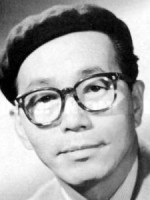Youri Ozerov is a Actor, Director and Scriptwriter Russe born on 26 january 1921 at Moscow (Russie)
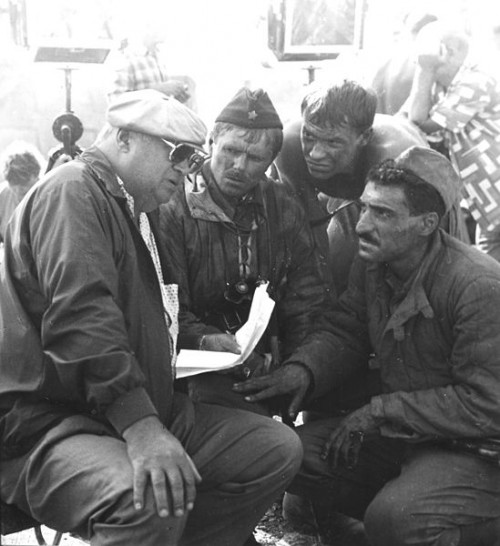
Yuri Ozerov (Russian: Ю́рий Никола́евич О́зеров; 26 January 1921 – 16 October 2001) was a Soviet film director and screenwriter. He directed twenty films between 1950 and 1995. Ozerov's works won him many awards, among them the title People's Artist of the USSR which was conferred upon him in 1977.
Ozerov was born to Nikolai and Nadezhda Ozerov. His mother, a student of the All-Union State Institute of Cinematography, had to leave her studies when she became pregnant. Ozerov's father was an acclaimed opera singer who was awarded the title People's Artist of the Russian SFSR in 1937 and taught in the Moscow Conservatory.
After graduating from high school, Ozerov enrolled for the Lunacharsky State Institute of Theatre Arts in September 1939. A month later, he was drafted into the Red Army, where he was trained as a signaler. When Germany invaded the Soviet Union, he held the rank of a Second Lieutenant. Ozerov participated in the Battle of Moscow and in the campaigns for Ukraine and Poland. In 1944, he underwent a staff officers' course in the Frunze Academy. While stationed in the 3rd Belorussian Front, he took part in the Battle of Königsberg as a forward observation officer. In a 2001 interview, he told that the battle had a profound effect on him and he swore that if he will remain alive, he would "tell the story of the great army that fought in the war." After the German surrender in May, Ozerov served in the occupied city until his discharge in October 1945, with the rank of a Major. During the war, Ozerov married a nurse, Raisa Sukhomlina, with whom he had a son, Vladimir. The two later divorced.
Breakthrough
Soon after demobilization, Ozerov resumed his studies in the Lunacharsky Institute. In 1947, he entered the All-Union Cinematography Institute, where he studied together with Aleksandr Alov, Marlen Khutsiev, Sergei Parajanov and other future Soviet directors. During the same year, he joined the Communist Party. In 1949 he started working as an assistant-director in the Mosfilm studio. While still a student, he made his debut film, Alexander Pushkin, in 1950. He graduated a year later.
In the beginning of his career, Ozerov directed several documentaries: in 1952, he made the film In the Nikitsky Botanical Garden about the eponymous garden. During 1953, together with Sergei Gurov, he co-directed Arena of the Bold, which presented a live performance by the Soviet Union's young circus artists and starred Oleg Popov, among others. In 1954, he made At the Gala Evening, showing a concert at the Bolshoi Theater.
Ozerov's first major feature film was the 1955 Son, revolving around the life of a delinquent youth in Moscow. In 1957, he directed the adventure film Kochubey, about the last days of the Civil War Cossack hero, Ivan Kochubey. The film, Ozerov's only one to be produced by Lenfilm, received the Prize for Best Musical Score in the 1959 All-Union Film Festival. In the same year, Ozerov first participated in an international production: the Albanian-Soviet film Fortuna, which he co-directed with Kristaq Dhamo. Fortuna was also his first film about the Second World War, dealing with the Albanian partisans' struggle and starring Naim Frashëri. In 1962, he directed the Soviet-Czechoslovak co-production The High Road, a biographical film on Jaroslav Hašek with Josef Abrhám as the main protagonist.
In addition to his cinematic work, Ozerov was also a Major in the KGB's Seventh Directorate, the department responsible for surveillance. He served as a technical officer. In early 1962, the KGB was monitoring Oleg Penkovsky. Miniature cameras were installed in flower pots on his apartment's window sills. The surveillance team suspected that Penkovsky discovered the cameras and was evading them. Ozerov had personally inspected the house and decided to place other equipment in the balcony above the apartment. Penkovsky was caught and executed during 1963.
Summit
During the mid-1960s, Ozerov - who was awarded the title 'Honored Artist of the RSFSR' in 1965 - was dismayed by several World War II films made in the West, which he regarded as diminishing the role of the Red Army. At the same time, the Soviet authorities were planning a film in response to The Longest Day that would present the official Soviet narrative on the war. Ozerov was selected to direct the new project, the five-part series Liberation, for which he co-wrote the script. The filming lasted more than four years, from 1967 to 1971. Ozerov had to cope both the tight political supervision of the Soviet establishment and with the technical difficulties of coordinating the battle scenes, that involved 150 tanks and thousands of soldiers. Ozerov's second wife, Dilara, was the films' costumes designer. For his work on Liberation, he received the Lenin Prize and the Tbilisi All-Union Film Festival Grand Prize at 1972.
Ozerov directed the first part of the documentary Visions of Eight on the Munich Olympics, entitled The Beginning. Visions of Eight won the 1973 Golden Globe Award for the Best Documentary Film. In 1974, he was given the title of a People's Artist of the RSFSR.
In 1977, Ozerov directed the ten hour long mini-series Soldiers of Freedom, theatrically released as two 220 minutes feature films, a co-production that involved most of the Eastern Block European countries and dealt with the exploits of their contemporary leaders, especially Leonid Brezhnev, during the Second World War. He was granted the title People's Artist of the USSR in the same year, and was a member in the jury of the 30th Cannes Film Festival and the 10th Moscow International Film Festival.
In 1979, Ozerov was selected to be the chief of the Moscow 1980 Olympics Artistic Committee. He directed a series of documentary films dedicated to the games: Ballad of Sport, Farewell to the Olympics, The Olympic Holidays and O, Sport - You're the World. For this accomplishment, he was awarded the USSR State Prize in 1981.
In 1985, Ozerov directed another large-scale World War II production, the Battle of Moscow, released for the 40th Anniversary of Victory Day. The film received the 1986 All-Union Film Festival Grand Prize.
Later years
In 1989, Ozerov decided to direct one more World War II film, Stalingrad. Due to the economical situation in the Soviet Union, he had to approach the Warner Bros. for assistance with the budget. The company agreed, but only on condition that American actors would receive major roles. The reluctant Ozerov had to cast Powers Boothe as General Chuikov.
In 1993, the director used footage from Stalingrad in the film Angels of Death, that presented a sniper dual taking place during the battle for the city. The new footage was filmed in Syria. selected material from all of Ozerov's works on World War II was compiled to create the historical mini-series Tragedy of the Century. In 1995, Ozerov produced a mini-series, The Great Commander Georgy Zhukov, consisting of all the scenes in his films that included Zhukov - in all of which he was depicted by Mikhail Ulyanov. In 2001, he received the Russian President's award for contribution to national cinema, dying shortly after. He is buried in the Vvedenskoye Cemetery, alongside his younger brother Nikolai, a famous sports commentator.
His widow founded the Yuri Ozerov War Films Festival in his memory.
Source : Wikidata
Youri Ozerov

- Infos
- Photos
- Best films
- Family
- Characters
- Awards
Nationality Russie
Birth 26 january 1921 at Moscow (Russie)
Death 15 october 2001 (at 80 years) at Moscow (Russie)
Awards People's Artist of the USSR, Order of Lenin, USSR State Prize, Medal of Zhukov, Medal "For the Victory over Germany in the Great Patriotic War 1941–1945", Order of the Red Banner
Birth 26 january 1921 at Moscow (Russie)
Death 15 october 2001 (at 80 years) at Moscow (Russie)
Awards People's Artist of the USSR, Order of Lenin, USSR State Prize, Medal of Zhukov, Medal "For the Victory over Germany in the Great Patriotic War 1941–1945", Order of the Red Banner
Biography
Early lifeOzerov was born to Nikolai and Nadezhda Ozerov. His mother, a student of the All-Union State Institute of Cinematography, had to leave her studies when she became pregnant. Ozerov's father was an acclaimed opera singer who was awarded the title People's Artist of the Russian SFSR in 1937 and taught in the Moscow Conservatory.
After graduating from high school, Ozerov enrolled for the Lunacharsky State Institute of Theatre Arts in September 1939. A month later, he was drafted into the Red Army, where he was trained as a signaler. When Germany invaded the Soviet Union, he held the rank of a Second Lieutenant. Ozerov participated in the Battle of Moscow and in the campaigns for Ukraine and Poland. In 1944, he underwent a staff officers' course in the Frunze Academy. While stationed in the 3rd Belorussian Front, he took part in the Battle of Königsberg as a forward observation officer. In a 2001 interview, he told that the battle had a profound effect on him and he swore that if he will remain alive, he would "tell the story of the great army that fought in the war." After the German surrender in May, Ozerov served in the occupied city until his discharge in October 1945, with the rank of a Major. During the war, Ozerov married a nurse, Raisa Sukhomlina, with whom he had a son, Vladimir. The two later divorced.
Breakthrough
Soon after demobilization, Ozerov resumed his studies in the Lunacharsky Institute. In 1947, he entered the All-Union Cinematography Institute, where he studied together with Aleksandr Alov, Marlen Khutsiev, Sergei Parajanov and other future Soviet directors. During the same year, he joined the Communist Party. In 1949 he started working as an assistant-director in the Mosfilm studio. While still a student, he made his debut film, Alexander Pushkin, in 1950. He graduated a year later.
In the beginning of his career, Ozerov directed several documentaries: in 1952, he made the film In the Nikitsky Botanical Garden about the eponymous garden. During 1953, together with Sergei Gurov, he co-directed Arena of the Bold, which presented a live performance by the Soviet Union's young circus artists and starred Oleg Popov, among others. In 1954, he made At the Gala Evening, showing a concert at the Bolshoi Theater.
Ozerov's first major feature film was the 1955 Son, revolving around the life of a delinquent youth in Moscow. In 1957, he directed the adventure film Kochubey, about the last days of the Civil War Cossack hero, Ivan Kochubey. The film, Ozerov's only one to be produced by Lenfilm, received the Prize for Best Musical Score in the 1959 All-Union Film Festival. In the same year, Ozerov first participated in an international production: the Albanian-Soviet film Fortuna, which he co-directed with Kristaq Dhamo. Fortuna was also his first film about the Second World War, dealing with the Albanian partisans' struggle and starring Naim Frashëri. In 1962, he directed the Soviet-Czechoslovak co-production The High Road, a biographical film on Jaroslav Hašek with Josef Abrhám as the main protagonist.
In addition to his cinematic work, Ozerov was also a Major in the KGB's Seventh Directorate, the department responsible for surveillance. He served as a technical officer. In early 1962, the KGB was monitoring Oleg Penkovsky. Miniature cameras were installed in flower pots on his apartment's window sills. The surveillance team suspected that Penkovsky discovered the cameras and was evading them. Ozerov had personally inspected the house and decided to place other equipment in the balcony above the apartment. Penkovsky was caught and executed during 1963.
Summit
During the mid-1960s, Ozerov - who was awarded the title 'Honored Artist of the RSFSR' in 1965 - was dismayed by several World War II films made in the West, which he regarded as diminishing the role of the Red Army. At the same time, the Soviet authorities were planning a film in response to The Longest Day that would present the official Soviet narrative on the war. Ozerov was selected to direct the new project, the five-part series Liberation, for which he co-wrote the script. The filming lasted more than four years, from 1967 to 1971. Ozerov had to cope both the tight political supervision of the Soviet establishment and with the technical difficulties of coordinating the battle scenes, that involved 150 tanks and thousands of soldiers. Ozerov's second wife, Dilara, was the films' costumes designer. For his work on Liberation, he received the Lenin Prize and the Tbilisi All-Union Film Festival Grand Prize at 1972.
Ozerov directed the first part of the documentary Visions of Eight on the Munich Olympics, entitled The Beginning. Visions of Eight won the 1973 Golden Globe Award for the Best Documentary Film. In 1974, he was given the title of a People's Artist of the RSFSR.
In 1977, Ozerov directed the ten hour long mini-series Soldiers of Freedom, theatrically released as two 220 minutes feature films, a co-production that involved most of the Eastern Block European countries and dealt with the exploits of their contemporary leaders, especially Leonid Brezhnev, during the Second World War. He was granted the title People's Artist of the USSR in the same year, and was a member in the jury of the 30th Cannes Film Festival and the 10th Moscow International Film Festival.
In 1979, Ozerov was selected to be the chief of the Moscow 1980 Olympics Artistic Committee. He directed a series of documentary films dedicated to the games: Ballad of Sport, Farewell to the Olympics, The Olympic Holidays and O, Sport - You're the World. For this accomplishment, he was awarded the USSR State Prize in 1981.
In 1985, Ozerov directed another large-scale World War II production, the Battle of Moscow, released for the 40th Anniversary of Victory Day. The film received the 1986 All-Union Film Festival Grand Prize.
Later years
In 1989, Ozerov decided to direct one more World War II film, Stalingrad. Due to the economical situation in the Soviet Union, he had to approach the Warner Bros. for assistance with the budget. The company agreed, but only on condition that American actors would receive major roles. The reluctant Ozerov had to cast Powers Boothe as General Chuikov.
In 1993, the director used footage from Stalingrad in the film Angels of Death, that presented a sniper dual taking place during the battle for the city. The new footage was filmed in Syria. selected material from all of Ozerov's works on World War II was compiled to create the historical mini-series Tragedy of the Century. In 1995, Ozerov produced a mini-series, The Great Commander Georgy Zhukov, consisting of all the scenes in his films that included Zhukov - in all of which he was depicted by Mikhail Ulyanov. In 2001, he received the Russian President's award for contribution to national cinema, dying shortly after. He is buried in the Vvedenskoye Cemetery, alongside his younger brother Nikolai, a famous sports commentator.
His widow founded the Yuri Ozerov War Films Festival in his memory.
Usually with
Filmography of Youri Ozerov (7 films)
Actor
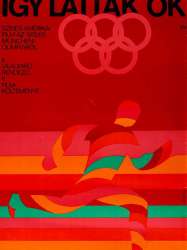
Visions of Eight (1973)
, 1h50Directed by Miloš Forman, John Schlesinger, Claude Lelouch, Arthur Penn, Kon Ichikawa, Mai Zetterling, Michael Pfleghar, Youri Ozerov
Origin USA
Genres Documentary
Themes Sports films, Documentary films about sports, Films about the Olympic Games
Actors Miloš Forman, Kon Ichikawa, Claude Lelouch, Arthur Penn, Youri Ozerov, John Schlesinger
Roles Narrator
Rating67%





Director
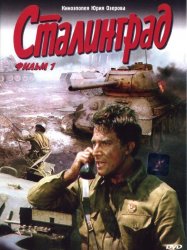
Stalingrad (1990)
, 3h16Directed by Youri Ozerov
Origin Tchecoslovaquie
Genres Drama, War, Historical
Themes Politique, Political films
Actors Powers Boothe, Fernando Allende, Mikhaïl Oulianov, Bruno Freindlich, Sergueï Garmach, Nikolai Kryuchkov
Rating68%





In January 1942, Adolf Hitler appoints Fedor von Bock to command Army Group South and supervise Operation Blau. The German forces advance in the south of Russia, scattering the Soviets and approaching Stalingrad, that seems on the verge of falling to the enemy's hands. The movie ends with Vasily Chuikov assuming command of the 62nd Army at September.
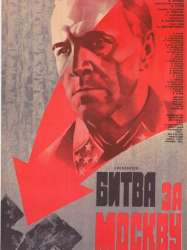
Battle of Moscow (1985)
, 5h58Directed by Youri Ozerov
Genres Drama, War
Themes Political films
Actors Olegar Fedoro, Juozas Budraitis, Lev Prygunov, Aleksandre Filippenko, Bruno Freindlich, Yury Yakovlev
Rating72%





In the aftermath of the victory in France, Hitler decides to attack the Soviet Union and selects Marshal von Bock in charge of leading Army Group Center of the Wehrmacht into Russia. Ilse Stöbe, Rudolf von Scheliha and Richard Sorge inform of the danger, but the Soviet intelligence dismisses their warnings. Zhukov is concerned that the army is ill-prepared; Pavlov decries him as a fear-monger. The Red Army officers are convinced that in the event of an invasion, they would immediately counter-attack. On 22 June 1941 Germany launches Operation Barbarossa, overwhelming the Soviets.

O Sport, You Are Peace! (1981)
, 2hDirected by Fyodor Khitruk, Youri Ozerov
Genres Documentary, Animation
Themes Sports films, Documentary films about sports, Films about the Olympic Games
Rating68%





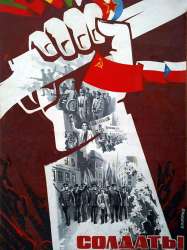
Soldiers of Freedom (1977)
, 9h59Directed by Youri Ozerov
Genres War, Historical
Themes Political films
Actors Yevgeny Semyonovich Matveyev, Vasily Lanovoy, Viktor Avdyushko, Anton Gorchev, Stanisław Jaśkiewicz, Naum Shopov
Rating58%





The film reflects the following events of World War II: the capitulation of Friedrich Paulus's Sixth Army as a result of the failed assault on Stalingrad during Operation Blue in 1942; the preparation for revolt in Slovakia; negotiations of the Polish communists with Władysław Sikorski's government over their joint struggle against fascism; the creation of a National Committee of the Domestic Front in Bulgaria and preparation by underground workers-communists for armed revolt; expansion of the guerrilla (partisan) movement; the failure of a German attempt to destroy People's Liberation Army of Josip Broz Tito; one of the largest military operations, Bagration; the beginning of the liberation of Poland; creation of the Polish National Government in Lublin; the Warsaw Uprising; the capitulation of Bór-Komorowski and defeat of the Polish patriots; the entry of Soviet and Polish armies into Warsaw.

Visions of Eight (1973)
, 1h50Directed by Miloš Forman, John Schlesinger, Claude Lelouch, Arthur Penn, Kon Ichikawa, Mai Zetterling, Michael Pfleghar, Youri Ozerov
Origin USA
Genres Documentary
Themes Sports films, Documentary films about sports, Films about the Olympic Games
Actors Miloš Forman, Kon Ichikawa, Claude Lelouch, Arthur Penn, Youri Ozerov, John Schlesinger
Rating67%





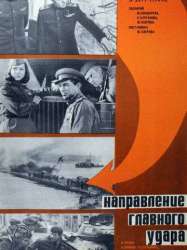
Liberation (film series) (1969)
, 1h10Directed by Youri Ozerov
Genres Drama, War, Romance
Themes Politique, Political films
Actors Nikolay Olyalin, Larisa Golubkina, Boris Seidenberg, Vsevolod Sanaïev, Vasily Shukshin, Fritz Diez
Rating76%





After the Soviets are alerted to the imminent German offensive in Kursk, they launch a preemptive artillery strike, delaying the enemy. The battalion of Lieutenant Colonel Lukin – led by officers Tzvetaev, Orlov, and Maximov – participates in the battle, as well as the tank of Lieutenant Vasiliev.

A Great Road Ahead (1963)
Directed by Youri Ozerov
Genres Drama, War, Comedy
Actors Josef Abrhám, Rudolf Hrušínský, Inna Goulaïa, Jaroslav Marvan, František Filipovský, Yury Yakovlev
Rating64%





Ce jour-là, Jaroslav Hasek, célèbre auteur de comédies et anarchiste convaincu, n'avait d'autre but que d'aller boire une bonne bière dans son café préféré.
Scriptwriter

Stalingrad (1990)
, 3h16Directed by Youri Ozerov
Origin Tchecoslovaquie
Genres Drama, War, Historical
Themes Politique, Political films
Actors Powers Boothe, Fernando Allende, Mikhaïl Oulianov, Bruno Freindlich, Sergueï Garmach, Nikolai Kryuchkov
Roles Writer
Rating68%





In January 1942, Adolf Hitler appoints Fedor von Bock to command Army Group South and supervise Operation Blau. The German forces advance in the south of Russia, scattering the Soviets and approaching Stalingrad, that seems on the verge of falling to the enemy's hands. The movie ends with Vasily Chuikov assuming command of the 62nd Army at September.

O Sport, You Are Peace! (1981)
, 2hDirected by Fyodor Khitruk, Youri Ozerov
Genres Documentary, Animation
Themes Sports films, Documentary films about sports, Films about the Olympic Games
Roles Writer
Rating68%





 Connection
Connection


